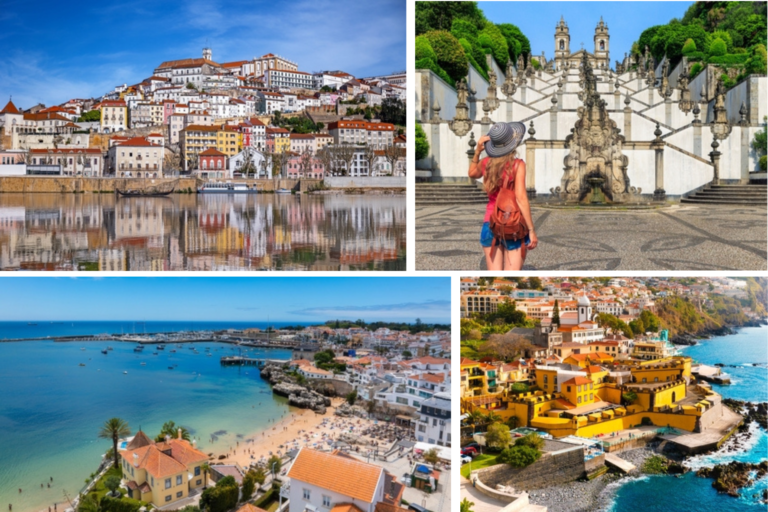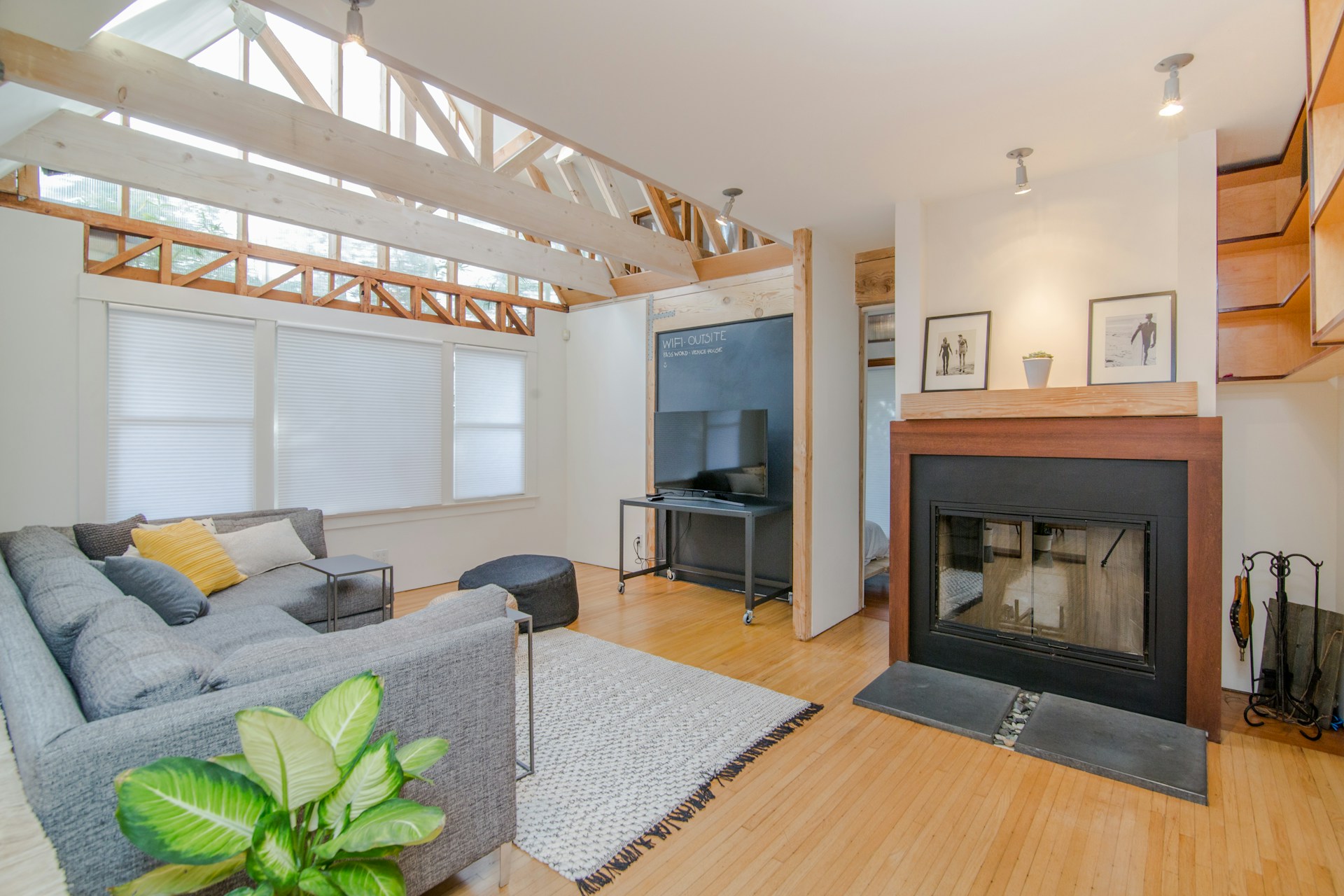Live in Portugal: Advantages, disadvantages & costs
If you want to know what it's like to live in Portugal, keep reading. We tell you about its quality of life, advantages and challenges.
Charming coastal towns, historic cities, and a laid-back lifestyle — these are just a few of the things that make Portugal so special. Nestled on the Iberian Peninsula, this country has become a top choice for digital nomads, students, expats, and retirees from around the world, thanks to its mild climate, affordable cost of living, and warm, welcoming people. If you’re curious about what it’s like to live in Portugal, stick around.
We’ve put together a complete guide for anyone thinking about moving to Portugal but still has a few questions. What’s the quality of life like? Is it affordable to live in the major cities? How good are the healthcare and education systems? Is it a safe place to live? We answer these questions and by the end, you’ll have a clear idea of whether Portugal is the right fit for you.
What is the quality of life like in Portugal?
Portugal is known for offering a great quality of life, especially for those looking for a sense of stability, mild weather, and easy access to essential services. Life here moves at a slower pace, and the welcoming atmosphere makes it easy to settle in. Add to that a deep and diverse cultural heritage and you’ve got a country full of charm, character, and plenty to explore.
Another big reason for Portugal’s high quality of life is its people that are known for being warm, friendly, and welcoming to newcomers. The country also has an affordable healthcare system, and both its cities and small towns are generally very safe, making it an ideal choice for anyone looking to start a new chapter abroad.
That said, living in Portugal is a very personal experience. Choosing the right city or town, speaking the language, and having a budget that matches your lifestyle can make all the difference. That’s why, to give you a clear picture of what life in Portugal really looks like, we’ve taken a closer look at key areas like healthcare, safety, education quality, and more.
1- Public and private education
If you’re planning a move with kids or thinking about studying in Portugal yourself, you might be wondering what the education options are like. Public schools are free and open to both locals and foreign residents, which is a big plus. Just keep in mind that classes are mostly taught in Portuguese, though some areas do offer bilingual programs. If you’d prefer schooling in another language, there are plenty of international and private schools that follow British, French, or IB curricula.
Private schools in Portugal are generally more affordable than in many other European countries, though prices can vary quite a bit depending on the city, the education level, and whether it’s a national or international school. For local private schools, monthly fees typically range from $340 to $690, while in international schools tuition starts around $800 and goes up to $1,700 per month.
Portugal’s public universities are well-regarded across Europe and offer relatively affordable tuition compared to other countries in the region. For EU students, annual tuition typically ranges from $800 to $1,700. For non-EU students, the cost is between $2,290 and $5,150 per year. Master’s and PhD programs tend to be more expensive, with fees ranging from $2,860 to $6,860 annually. That said, if studying in Portugal feels financially out of reach, there are scholarship opportunities available that can help ease the burden.
2- Security and citizen awareness
Portugal ranks among the safest countries in Europe. According to last year’s Global Peace Index, it’s in the top ten worldwide. Crime rates are low, violent offenses are rare, and there’s a strong level of trust in the police. Most cities are well-lit and walkable, making it a place where even women can feel safe.
Some of Portugal’s safest cities include Braga, Viseu, Évora, Coimbra, Cascais, Aveiro, and Funchal on the island of Madeira. Lisbon, meanwhile, is known for its overall sense of order and respect, friendly people, and a more relaxed pace compared to other capital cities. In fact, many locals praise Lisbon for being a calm and safe place to live. Neighborhoods like Campo de Ourique, Parque das Nações, Estrela, Lapa, and Alvalade are often highlighted as some of the safest areas in the city.
Quick tip for remote workers: Braga and Coimbra are also among the top cities for digital nomads in Portugal, so they’re worth considering if you’re living the remote lifestyle.

3- Cost of living in Portugal
One of Portugal’s biggest draws is its lower cost of living compared to many other European countries. This is especially appealing for remote workers and digital nomads earning in foreign currencies.
The average salary in Portugal is around $1,150 to $1,500, though salaries tend to be higher in fields like tech and finance. When it comes to cost of living, Lisbon and Porto are the priciest cities, especially with rent prices rising in recent years. On the other hand, places like Coimbra, Braga, and the Alentejo region offer great quality of life at a more affordable price.
Looking for affordable housing in Lisbon? With some patience and a bit of research, you can find a great place to live in the city without breaking the bank. If you’re a student, university dorms are a solid option, while remote workers might want to consider coliving spaces as a convenient and budget-friendly choice.
Beyond just finding a place to live, having a clear budget is essential for a comfortable life in Portugal. Knowing how much you’ll need each month and what extras you can afford makes all the difference.
4- Health and medical care system
As a legal resident in Portugal, you can benefit from the public health system, which gives you access to government-run hospitals. The care is generally reliable, but some specialist appointments might take longer than expected. Because of this, many foreigners opt for private health insurance to get quicker service at private clinics. While it might seem like an extra expense, paying directly for healthcare can cost you even more, so having good insurance with broad coverage and multilingual support is usually the smarter choice.
Healthcare in Portugal is known for its quality, especially in larger cities where medical staff often speak English in centers that see many international patients. This is an important point, since language can be a real barrier when you’re just starting out.
5- Connectivity for remote work
In today’s digital age, having reliable internet is a big part of quality of life. Being able to handle many tasks through apps or online not only saves time but also reduces stress. Plus, with remote work booming worldwide, cities need to provide fast and secure internet to keep up.
When it comes to digital infrastructure, Portugal is modern and continually improving. Many homes across the country have access to fiber optic internet with speeds up to 1 Gbps. Mobile coverage is also strong, even in rural areas. Providers like MEO, NOS, and Vodafone offer comprehensive packages that include internet, mobile, and TV services.
In addition, there is a growing network of coworking and coliving spaces, especially in Lisbon and Porto, making Portugal an ideal destination for digital nomads and remote workers.
Pro tip for staying connected in Portugal: If you want internet as soon as you arrive, a monthly plan from Holafly has you covered. You can pick between limited or unlimited data and enjoy fast, secure service at a great price. Plus, the best part is that the same plan works in over 170 countries since their eSIM is global.
Important: If you are a frequent traveler and want to stay connected without worrying about expensive roaming or looking for a new SIM at every destination, Holafly’s subscription plans are for you. With a single eSIM, enjoy internet in more than 170 countries for a fixed price and no surprises on your bill. Travel without limits and connect easily and securely! 🚀🌍

What are the advantages of living in Portugal?
You’ve now got a pretty good overview of what life in Portugal is like, which should give you a sense of the benefits it offers. But let’s dive a little deeper so you can fully understand all the advantages of living there.
These are some of the reasons why so many foreigners choose to settle in Portugal, either for a season or permanently.
1- Affordable cost of living and tax benefits
One of Portugal’s biggest advantages is its affordability compared to other European countries like France, Germany, or the UK. This difference really shows up in everyday expenses like rent, groceries, transport, and even entertainment. For instance, a furnished apartment in central Barcelona can cost anywhere from $1,600 to $2,860, while in Lisbon or Porto, you can find similar places for about $1,150.
Another perk of living in Portugal is the tax benefits it offers. Thanks to its Non-Habitual Resident (NHR) program, the country attracts foreign residents who can take advantage of significant tax exemptions. This helps them reduce their tax burden while enjoying Portugal’s high quality of life.
2- Public safety and tranquility
Portugal ranks among the safest countries globally, which makes day-to-day life peaceful. A strong sense of community and respect for public spaces helps create a constant feeling of safety, whether you’re in a big city or a small town. This makes Portugal an ideal choice for families, seniors, or anyone who values a stable and predictable environment.
Here’s an interesting fact about Portugal: If you’re coming from a country with political unrest you’ll notice how much political stability adds to the overall sense of safety. Portugal’s democratic system ensures peaceful transitions of power and protects the rights and freedoms of both residents and foreigners alike.
3- Mild climate, environmental quality and contact with nature
One of the main draws for many people moving to Portugal is the wonderful Mediterranean climate. Winters are generally mild while summers are long and sunny. Areas like the Algarve and Lisbon offer great weather for outdoor activities nearly all year, with fresh air and nature always close by.
If you love being close to nature, Portugal has plenty to offer. From laid-back fishing villages and beautiful beaches to mountains perfect for hiking, trekking, and cycling, there’s something for every outdoor enthusiast. Even Madeira Island—with its stunning landscapes, beaches, and natural pools—is becoming a hotspot for digital nomads, featuring growing options for long-term stays, coworking spaces, and coliving communities.

4- Accessible and reliable healthcare system
Being a legal resident means you can take advantage of Portugal’s public healthcare system, which offers good quality care without breaking the bank. Private medical services are also fairly priced compared to other parts of Europe, especially if you have extra insurance to cover costs.
Keep in mind that as of 2025, the Portuguese government passed a law limiting free access to the National Health Service for undocumented immigrants and non-residents. Because of this, having health insurance is essential for foreigners who want quality medical care while keeping costs manageable. This way, you can strike a good balance between cost and quality (something that’s not always easy to find elsewhere in Europe).
5- Relaxed lifestyle and fine dining
Portuguese cities don’t get caught up in the hectic pace of major European capitals. Here, people value time, personal connections, and the simple moments, living life at a slower, more relaxed rhythm. You can see it in everything, from how schedules are handled to the emphasis placed on sharing meals together.
Portuguese food is something special. It’s tasty, filling, budget-friendly, and reflects the country’s deep connection to the sea and its diverse cultural roots. The influence of many different cultures shows up in the flavors and dishes, from fresh fish to the iconic custard tarts. And of course, Portugal’s Port and Madeira wines are famous worldwide.
6- Ease of adaptation for foreigners
Portugal is known for its warm and welcoming people. Locals are used to living alongside foreigners and tend to greet newcomers with kindness, making it easier to settle into local customs. There’s also a growing international community, with plenty of support groups, events, and activities happening across different cities.
One thing that makes adapting easier for foreigners is that English is pretty common in major cities, especially among younger people. In smaller towns, picking up Portuguese comes naturally through everyday immersion. So even if the language feels tough at first, over time you’ll find yourself speaking it with much more confidence.
7- Possibility of obtaining a digital nomad visa
Last but not least, getting a visa to live in Portugal is quite simple, as the country has several options, even for digital nomads.
The D8 visa lets remote workers and digital nomads live legally in Portugal, provided their job or clients are outside the country. They usually issue it for a year at first, and you can extend it for another five years if you meet certain requirements. Just a heads-up: this visa doesn’t allow direct employment with Portuguese companies, but you can still work on your own projects or for businesses abroad.

What are the disadvantages and challenges of living in Portugal?
Portugal offers many perks, but it’s not all smooth sailing. Just like moving to any new country, there are challenges and bumps along the way. It’s good to know what you might be up against before making the move. So, here’s a rundown of some things foreigners often encounter.
1- Low salaries in relation to the cost of living
While the cost of living in Portugal is generally lower than in other European capitals, average salaries tend to be lower, especially in industries like retail, hospitality, and services. This can make saving money tough or affect your lifestyle if you’re earning locally. But if you work remotely for clients abroad, your situation will likely be very different.
If you’re planning to work locally, it’s a good idea to research the job market and typical salaries ahead of time so you know what to expect and can plan accordingly.
2- Competitive labor market and slow bureaucracy
Building on the previous point, it’s worth noting that Portugal’s job market can be quite competitive, especially when it comes to landing higher-paying roles. While the country has seen solid economic growth in recent years, it can still be tough for foreigners to find well-paid positions—particularly if you don’t speak Portuguese or don’t have local connections.
One thing that often tests your patience in Portugal is the bureaucracy. Simple processes like getting your tax ID, registering your residence, or setting up a bank account can drag on longer than you’d hope. Rules aren’t always clear, and what works in one office might be completely different in another. On top of that, a lot of the paperwork isn’t available in English.
We recommend you to look for help in expat communities or use a local manager. There are also official sites that can provide you with step-by-step guides.
3- Difficulty in finding housing in sought-after areas
Over the past few years, rent in cities like Lisbon, Porto, and the Algarve has gone up quite a bit. Tourism is rising, and platforms like Airbnb are listing more properties, which reduces the number of long-term rentals available. That means finding a place to live can be more challenging and costlier than before.
No worries, if you do your homework and look beyond the city center, you’ll find more affordable options. Neighborhoods a bit farther out, or even smaller cities like Braga, Coimbra, or Setúbal, often offer great places to live at a much lower cost, without sacrificing quality of life.
4- Initial language barrier
People new to Portugal often struggle to get used to the language. Be patient, it’s totally worth the effort. Learning the language will make everyday life smoother and help you connect with locals on a deeper level. It’s one of the best ways to really feel at home.
People commonly speak English in big cities and among younger people. However, when dealing with official paperwork, visiting public healthcare centers, or if you plan to live in rural areas, knowing Portuguese becomes essential.
5- Uneven infrastructure
Finally, another important factor to keep in mind when choosing where to live in Portugal is infrastructure, which can be lacking in some areas. In the bigger cities services run smoothly, public transport is reliable, and everyday life flows without major issues.
However, in rural areas, public transportation might be limited, roads aren’t always in the best shape, and healthcare facilities can vary in quality. Of course, places like Tomar and its surroundings might offer a lower cost of living, but you may notice significant differences compared to what you’re used to back home.

Frequently asked questions about living in Portugal
Coliving costs in Portugal depend a lot on the location, amenities, and length of stay. In bigger cities like Lisbon and Porto, monthly fees generally range from $970 to $1,700. Meanwhile, in smaller places such as Braga or Madeira, prices tend to be lower, starting at about $690 a month. Usually, these prices include your room, essential utilities like internet and electricity, use of common areas, and often social or community events.
Not necessarily, since many universities offer programs in English, especially at the master’s and doctoral levels. Still, having a basic grasp of Portuguese can make daily life easier and help you settle in better.
Yes, some banks in Portugal, like Millennium BCP and Caixa Geral de Depósitos, offer accounts for non-residents. Additionally, digital banks such as Revolut let you open an account online without needing official residency.
In bigger cities like Lisbon and Porto, a single metro ticket usually costs about $1.80, while city buses are around $1.95. Taxis start at a base fare of $3.90, plus roughly $0.55 for every kilometer traveled.
A single person can live comfortably on a budget of around $1,115 to $1,700 per month, though this varies depending on the city and lifestyle. Keep in mind that Lisbon and Porto tend to be pricier, while places like Alentejo, Braga, or Coimbra offer a noticeably lower cost of living.





 Language
Language 


















 No results found
No results found








